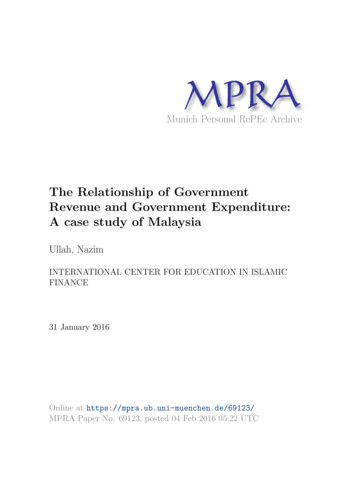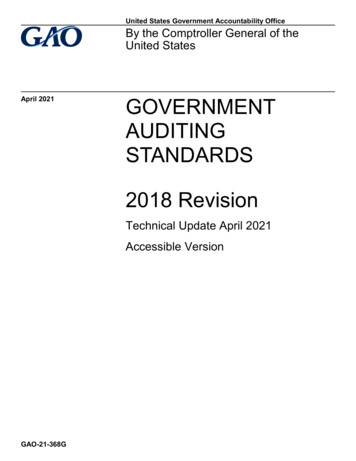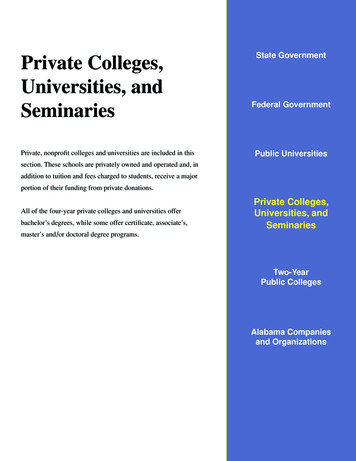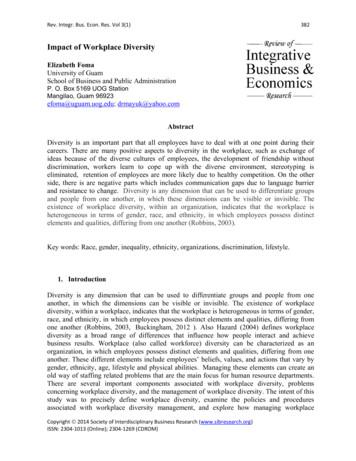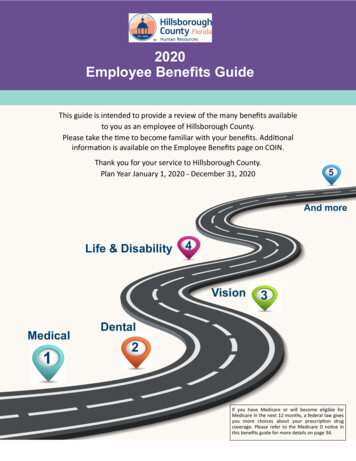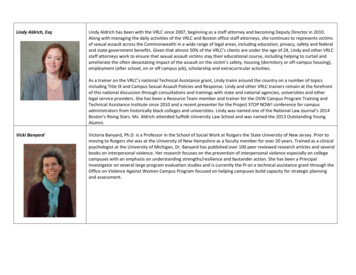
Transcription
Lindy Aldrich, EsqLindy Aldrich has been with the VRLC since 2007, beginning as a staff attorney and becoming Deputy Director in 2010.Along with managing the daily activities of the VRLC and Boston office staff attorneys, she continues to represents victimsof sexual assault across the Commonwealth in a wide range of legal areas, including education, privacy, safety and federaland state government benefits. Given that almost 50% of the VRLC’s clients are under the age of 24, Lindy and other VRLCstaff attorneys work to ensure that sexual assault victims stay their educational course, including helping to curtail andameliorate the often devastating impact of the assault on the victim’s safety, housing (dormitory or off-campus housing),employment (after school, on or off campus job), scholarship and extracurricular activities.As a trainer on the VRLC’s national Technical Assistance grant, Lindy trains around the country on a number of topicsincluding Title IX and Campus Sexual Assault Policies and Response. Lindy and other VRLC trainers remain at the forefrontof this national discussion through consultations and trainings with state and national agencies, universities and otherlegal service providers. She has been a Resource Team member and trainer for the OVW Campus Program Training andTechnical Assistance Institute since 2010 and a recent presenter for the Project STOP NOW! conference for campusadministrators from historically black colleges and universities. Lindy was named one of the National Law Journal’s 2014Boston’s Rising Stars. Ms. Aldrich attended Suffolk University Law School and was named the 2013 Outstanding YoungAlumni.Vicki BanyardVictoria Banyard, Ph.D. is a Professor in the School of Social Work at Rutgers the State University of New Jersey. Prior tomoving to Rutgers she was at the University of New Hampshire as a faculty member for over 20 years. Trained as a clinicalpsychologist at the University of Michigan, Dr. Banyard has published over 100 peer reviewed research articles and severalbooks on interpersonal violence. Her research focuses on the prevention of interpersonal violence especially on collegecampuses with an emphasis on understanding strengths/resilience and bystander action. She has been a PrincipalInvestigator on several large program evaluation studies and is currently the PI on a technical assistance grant through theOffice on Violence Against Women Campus Program focused on helping campuses build capacity for strategic planningand assessment.
Chief Justice Richard Barajas,RetChief Justice Richard Barajas (Ret.), is a graduate of Baylor University in Waco, Texas. He holds degrees in Sociology, Law,as well as a Masters of Education, Administration and Supervision. He served in the United States Naval Judge AdvocateGeneral's Corps as a trial attorney in Norfolk, VA, a staff attorney in the Azores, Portugal, and as a legislative attorney onCapitol Hill in Washington, D.C. He was an elected Texas District Attorney and well as the Chief Justice of the Texas Courtof Appeals in El Paso. He retired from elected judicial service and took the non-elected status of senior justice in August2006. He is currently assigned to the Eighth District Court of Appeals. Today, he serves as the Executive Director of theNational Organization for Victim Assistance.Chief Justice Barajas is a former faculty member of the National Judicial College in Reno, Nevada, where he was aninstructor on the use of information technology. He served as a designer of the State of Texas Judicial Commission onInformation Technology and as the original Chair of the Appellate Court Technology Committee. In addition, he hasserved on both the elected and advisory boards of NOVA since 1988. A nationally recognized lecturer on the properbalancing of the constitutional rights between the criminal defendant and the intended victim, Chief Justice Barajas washonored by the President of the United States at a White House ceremony as a national recipient of the PresidentialAward for Victim Services. He is a frequent lecturer on the following topics: Effective Communication Skills in VictimServices; A Victim Advocate's Guide to the First Amendment; An Overview of Crisis Response, a Primer for Prosecutors;Essential Qualities of Leadership; Ethics in Victim Advocacy; Implicit Bias in the Judicial Process; The Fight Against Crimesof Hate; The Various Stages of Victimization; and The Victim Advocate as an Officer of the Court, A Judicial Perspective,among other topics.Anneliese BrownAnneliese (Liese) Brown has been working to address domestic and sexual violence for 13 years. She currently serves as asenior program associate for the Vera Institute of Justice’s Center on Victimization and Safety. As a member of theAccessing Safety Initiative team, she works closely with community collaborations striving to improve services to victimsof domestic and/or sexual violence who have disabilities or are Deaf. She’s also a member of the Supervised VisitationInitiative team, and in this role has supported over 30 communities seeking to create or enhance visitation and exchangeservices that address the unique safety needs of victims of domestic violence and their children. Prior to joining Vera, sheworked for the Vermont Network on Domestic and Sexual Violence and the National Council of Juvenile and Family CourtJudges. Anneliese has presented to national audiences on a variety of issues related to interpersonal violence, includingsupervised visitation, developing policies that account for victim safety, creating and sustaining collaborations, andproviding accessible services to victims with disabilities and Deaf victims. Her work is grounded in her experience servingvictims and children in Maine, Vermont, Alaska, and California. Anneliese has a bachelor’s degree in women’s studies andpsychology from Bates College in Maine.
Shannon CollinsShannon Collins is the Campus Training and Technical Assistance Program Manager at the Center on Domestic Violence atthe University of Colorado Denver. In this capacity, she provides training and technical assistance on the development andeffectiveness of coordinated community response teams to campuses funded through the United States Department ofJustice, Office on Violence Against Women’s Campus Program. A licensed clinical social worker, Shannon has over 16 yearsof experience working to end gender-based violence through advocacy, response, prevention, and education in Universitysettings. Shannon serves on the Leadership Council for the Campus Advocates and Prevention Professionals Association(CAPPA), a national organization for campus professionals working to end gender-based violence on college and universitycampuses. She holds a Bachelor of Arts degree in Anthropology, a Master of Social Work degree, and a Women’s StudiesCertificate of Graduate Study from the University of South Carolina. When she is not seeking to bring more peace and justiceinto the world by lifting the voices of survivors, she enjoys exploring the wild west with her partner in life and two adorableand rowdy children.Jill DunlapJill Dunlap is the Director for Equity, Inclusion and Violence Prevention at NASPA-Student Affairs Administrators in HigherEducation. Prior to joining NASPA, Jill was Director of the University of California, Santa Barbara Campus Advocacy,Resources & Education (CARE) Program for four years. Jill has also served as the Director of the Women’s Center atNorthern Illinois University, and the Assistant Director of the Women’s Resource Center at the University of Missouri-KansasCity. In 2014, Jill served as the non-federal negotiator representing four-year, public institutions on the Violence AgainstWomen Act negotiated rulemaking committee. Jill has been trained as a domestic violence and sexual assault advocate inIllinois, Kansas, Missouri and California, and has more than 2,000 hours of advocacy and crisis intervention training. She hasworked closely with college student survivors of interpersonal violence in a professional capacity for more than 14 years. Jillwas one of 29 members of the University of California Presidential Task Force to Reduce Sexual Violence and Sexual Assault,which was charged with revising the University of California policy on Sexual Harassment and Sexual Violence to align withthe 2013 reauthorization of VAWA. Jill has written four successful Grants to Reduce Sexual Assault, Domestic Violence andStalking on Campus through the Department of Justice, Office on Violence Against Women on three different campuses,totaling more than 800,000. Jill has extensive training in both Title IX and Clery compliance. In addition, Jill has been anadjunct faculty member at a diverse range of institutions, including a two-year community college, a four-year publicinstitution and a for-profit institution, teaching in the field of Sociology. In addition, Jill taught the first for-credit coursefocused on understanding interpersonal violence on campus at UCSB in Fall 2012 with the Feminist Studies Department. Jillcompleted her PhD in Political Science and Public Administration at Northern Illinois University in Fall 2016, where herdissertation work focused on the experiences of students impacted by sexual violence on campus. In addition to herdissertation research, Jill is the principle investigator on several other IRB-approved research projects related to genderbased violence on campus. Among those projects is a needs assessment of prevention educators and advocates on campus,a campus website content analysis assessing for resources provided to survivors, and a salary survey of campusprofessionals. Jill’s research can also be found in the 2016 book, Preventing Sexual Violence on Campus: ChallengingTraditional Approaches Through Program Innovation.
Gina FirthGina Firth, MA, NBCC, is the Associate Dean of Wellness at The University of Tampa and provides leadership and functionalresponsibility for all wellness programming on campus. Gina’s supervises the areas of Campus Recreation; Health andCounseling Services; Wellness Services, including all alcohol and other drug prevention and intervention programs; and theFaith, Values and Spirituality program. In addition, Gina began the Sustained Dialogue program for The University of Tampa,and currently leads this initiative on campus. Previous to her appointment at The University of Tampa, Gina was the Directorof Alcohol and Drug Education at The University of Notre Dame for 12 years. Throughout her career, Gina has developedand disseminated social marketing programs and created many targeted prevention, education and intervention programsin all areas of health and wellness based on research methodology. Gina regularly guest lectures in the classroom, providesworkshops and programs for faculty, staff and students on all areas of wellness, and has presented at numerous regionaland national conferences. Gina received her B.S. in psychology, B.S. in education and MA in counseling from CentralMichigan University and is a nationally certified counselor. Gina is an active board member for the Hillsborough CountyAnti-Drug Alliance (HCADA), HCADA marijuana task force, Tampa Alcohol Coalition, HCADA Prescription Drug Task Force,Wellness Council of Tampa Bay, and current member/former chair of the Tobacco-Free Partnership of Hillsborough County.Professional memberships include the American College Health Association (ACHA), National Association for StudentPersonal Administrators (NASPA), National Intramural and Recreational Sports Association (NIRSA), American CounselingAssociation (ACA) and The National Wellness Institute.Monnie Huston WertzMonnie Huston Wertz is currently serving as the Assistant Vice President of Operations and Planning at the University ofTampa. In this position, she directs UT’s victim advocacy program, provides advocacy and crisis counseling to survivors, andengages University groups in research, presentations, and trainings. She founded UT’s Victim Advocate program whichincludes advocates designated by the State of Florida, a 24-hour response hotline and includes not only sexual assaultvictims but victims of other violent crimes as well. She is responsible for the co-creation and administration of the annualcampus climate survey and has authored campus policy statements around sexual harassment and Title IX issues. She hasexperience working with regional and national professional organizations as well as city and state agencies in the areas ofadvocacy, mental health, and emergency preparedness. She is currently pursuing her doctoral degree at the University ofSouth Florida in Interdisciplinary Education with a focus on the formation of critical thinking in collegiate populations. Shehas earned a BA in History from Mary Washington College and an MEd in Curriculum and Instruction from VirginiaCommonwealth University. She is a member of the Campus Advocacy and Prevention Professional Association (CAPPA),Higher Education Case Managers Association (HECMA), and the International Association of Emergency Managers (IAEM).
Mahri IrvineMahri Irvine is an educator and researcher whose interests include the cultural causes of gender-based violence; physicaland psychological harms caused by violence; motivations and attitudes of perpetrators; and best practices for violenceprevention and culture change. Involved in the movement to end men’s violence against women and children since 2001,Dr. Irvine has academically studied gender-based violence, worked directly with survivors, and provided countless hours ofguidance and assistance to professional service providers.Dr. Irvine earned her doctorate in Anthropology from American University in 2014. She is formally trained in anthropologyand qualitative research methods, and she values a holistic, multi-disciplinary approach to research and teaching. Dr.Irvine’s professional and academic work focuses on gender-based violence in the United States. Her first major researchstudy examined the impact of sexual victimization on women’s pathways to crime and prison, and she has conductednumerous trainings about this topic for professionals in counseling, nursing, law enforcement, and advocacy. Dr. Irvineserved as the Director of Campus Initiatives for the Indiana Coalition to End Sexual Assault (ICESA) from 2016 to 2018. In thisrole, Dr. Irvine created and managed ICESA’s statewide Campus Consortium, providing guidance and assistance aboutgender-based violence prevention and response to colleges and universities throughout Indiana. Previously, Dr. Irvineserved as Indiana University’s Statewide Sexual Assault Education and Prevention Specialist. Dr. Irvine is an adjunct facultymember at American University; since 2011, she has regularly designed and taught courses focusing on gender, violence,and culture.In addition to academically studying gender-based violence, Dr. Irvine has four years of volunteer experience workingdirectly with survivors of sexual violence, intimate partner violence, and stalking. She facilitated a support group for femalesurvivors of violence at a prison reentry organization in Washington, DC, served for three years as a rape crisis counselorand supervisor at the DC Rape Crisis Center in Washington, DC, and served for one year as a rape crisis counselor with RapeVictim Advocates in Chicago. She also served for six years as a volunteer at the Indiana Coalition Against Sexual Assault. Dr.Irvine’s experiences working with rape survivors in Chicago profoundly affected her personal and professional outlook onthe world, and launched her career as an anthropologist. Dr. Irvine is the founder of THRIVE Research and Education, LLC, aconsulting agency for gender-based violence response and prevention.Jennifer LandhuisJennifer Landhuis (M.S.) is the Director of the Stalking Prevention, Awareness, and Resource Center (SPARC), an AEquitasinitiative. As Director of SPARC, she oversees the development of resources and publications as well as training andtechnical assistance on stalking. Prior to joining AEquitas, Jennifer was the Director of Social Change at the Idaho CoalitionAgainst Sexual & Domestic Violence.
Casey MalsamShannon NixCasey is a confidential advocate for primary and secondary survivors of all forms of interpersonal violence. This includeshelping students navigate the on/off campus reporting structures, working with professors to communicate about academicperformance, offering a support group, and providing crisis intervention skill building with survivors. In addition, Caseyadvises three feminist student organizations, instructs Women’s Studies courses, and organizes the University’s 24-hourinterpersonal violence hotline. Casey works to provide prevention and advocacy from an intersectional and social justicelens. She is an active member of CAPPA and the Colorado Collation Against Sexual Assault. She has presented both atconferences and in webinars in an effort to help give back to the field from which she has learned so much. Casey holds B.A.from the University of Kansas in Art History with a minor in Women’s Studies and an M.A. from Lake Forest College in LiberalStudies with a concentration in Women’s Studies. She is currently working on a second M.A. at Colorado State University inMental Health Counseling. In her free time, Casey can often be found in the mountains or diving into a good book.Shannon Nix is the Associate Director of Sexual Assault and Violence Intervention & Prevention (SAVIP) at theUniversity of South Carolina. As SAVIP’s Associate Director, Shannon oversees the university’s confidentialinterpersonal violence advocacy and prevention program. Shannon specializes in training on the neurobiology oftrauma and intimate partner violence, and as a former college counselor, has a background in utilizing evidencebased therapies to treat sexual abuse and assault survivors. In addition, Shannon is active in the local community,collaborating closely with the local rape crisis center and serving on Sexual Assault Response Teams for twocounties, having co-chaired the SART for the county in which USC is situated. Shannon leads her team from atrauma-informed, evidence-based, and survivor-centered approach for both advocacy and prevention work.Shannon holds a B.S. in Psychology from the University of South Carolina-Aiken and an M.S. in Clinical Psychologyfrom Augusta State University; she is also a Licensed Professional Counselor and a Victim Service Provider in SC.She lives in Columbia, SC, with her 95-pound English Bulldog/Mastiff mix, Lena.
Maria Cristina Pacheco AlcalaMaría Cristina Pacheco Alcalá is the Program Coordinator at National Latin@ Network. She coordinates and implementstraining and technical assistance for campus grantees from the Office of Violence Against Women (OVW). She has beendoing campus prevention work since 2007, working with Peer Educators, training law enforcement and judicial boardmembers, coordinating the Coordinated Community Response Team, developing awareness activities, reviewing andupdating policies, working with external collaborators, etc. Mostly, her areas of expertise are related to feminism, genderconstruction and roles, dating and domestic violence, stalking, sexual assault, human rights — especially sexual andreproductive rights. All the work is framed from a gender perspective and including participatory methodologies to makethe work more pertinent for participants and for it to be also a continuous learning process for her.Cari SimonCari Simon graduated from Harvard Law School, cum laude. She was the President of the Harvard Women’s Law Associationand Co-Editor-in-Chief of the Harvard Journal on Law and Gender. Following law school, Cari clerked for Judge MorganChristen of the Ninth Circuit Court of Appeals, and then served as the inaugural fellow at the Harvard Law School GenderProgram where she represented victims of campus sexual assault in the Title IX context. For several years prior to lawschool, Cari worked on Capitol Hill, including as the director of the Congressional Victims’ Rights Caucus.Cari has partnered with NCVBA to provide advanced legal training on Title IX and school sexual violence to United StatesAttorney Generals across the country. Cari is a leader in the national movement to address campus sexual assault, servingon the Board of Know Your IX and the Advisory Council of the National Crime Victims Law Institute, and working closely withthe National Women’s Law Center, Public Justice, and the United Stated Department of Justice, Office of Violence AgainstWomen among others. Cari trains campus advocates nationally as a National Organization for Victim Assistance facultymember and serves on the End Sexual Violence in Education Leadership Council. Cari’s nationwide law practice focuses onthe civil representation of victims of school related sexual violence and other misconduct.
Danica WolfDanica Wolf served as the Lead Coordinator of the RSVP Center at the University of Missouri in the Department of SocialJustice for 8 years. Wolf was the primary campus advocate and prevention educator for a campus of almost 35,000undergraduate students before managing a team of professional staff members, graduate assistants, undergraduatestudent workers, leaders, interns, volunteers and the Green Dot Team of over 50 multidisciplinary faculty and staff. Wolfholds a Bachelor of Social Work degree, a Master of Social Work with a concentration on policy, planning and administrationand a Multicultural Certificate from the University of Missouri. She served as a Co-Facilitator for CAPPA, a leader in theNASPA Sexual and Relationship Violence Prevention and Response Knowledge Community, faculty for the National Centerfor Campus Public Safety’s Trauma-Informed Investigation and Adjudication Training Program and adjunct faculty teaching acourse on Contemporary Issues in Domestic Violence at Mizzou. Wolf consistently advocates for equity for all, workingwithin systems to influence change at all levels. Danica now runs her own consulting firm and birth doula/educationbusiness in Columbia, Missouri.
ameliorate the often devastating impact of the assault on the victim’s safety, housing (dormitory or off-campus housing), employment (after school, on or off campus job), scholarship and extracurricular activities. As a trainer on the VRL’s national Technical Assistance gra

